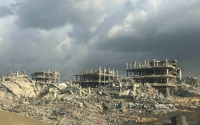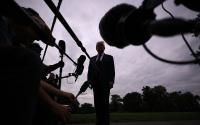Richard Norton-Taylor
Wednesday October 20, 2004
Up to a thousand foreign jihadists have infiltrated Iraq, but this is a fraction of al-Qaida's potential strength, a respected military thinktank said yesterday.
The foreign fighters are operating with the Sunni Ba'athists loyal to Saddam Hussein who began the insurgency, and possibly with Shia militias as well, according to the the London-based International Institute for Strategic Studies.
Basing its findings on information from its specialist contacts, including sources in governments and intelligence agencies, the institute said the invasion of Iraq had "enhanced jihadist recruitment and intensified al-Qaida's motivation" to mount terrorist operations.
The organisation estimated that al-Qaida had more than 18,000 potential terrorists in 60 countries, sympathetic, in varying degrees, to its cause.
"Furthermore, the substantially exposed US military deployment in Iraq presents al-Qaida with perhaps its most attractive 'iconic' target outside US territory," the report, The Military Balance, concluded.
"Galvanised by Iraq, if compromised by Afghanistan, al-Qaida remains a viable and effective 'network of networks'," the institute warns. After losing its training and command base in the Afghanistan war, al-Qaida dispersed, its leaders relinquishing operational initiative and responsibility to "local talent", according to the report.
But intelligence obtained by the US suggested that some of al-Qaida's activities, particularly bomb-making, had become more centralised and therefore "potentially more efficient and sophisticated".
Al-Qaida now needed less money to operate, and increasingly used the informal hawala system of financial transfers and remittances, which is based on trust rather than a paper trail and is difficult to regulate, the thinktank said.
Through regime change in Iraq, the report said, Britain and the US intended to usher democracy into the Gulf region to advance a long-term political convergence between Islam and the west.
Yet the insurgency and other state-building problems cast doubt on the political benefits of the entire Iraqi operation.
The report dismissed claims by US officials that the influx of jihadists into Iraq brought more terrorists into a smaller "killing zone". The al-Qaida movement was unlikely to concentrate forces in any one country, the institute said, adding that the 1,000 foreign fighters estimated to be in Iraq were a "minute fraction of its potential strength".
The institute's director, John Chipman, said yesterday: "The outcome of the US-led international effort to bring stability to the country is far from certain as the most powerful military power in the world struggles with a multi-faceted insurgency."
He said it could take five years before Iraq's own security forces were able to guarantee stability themselves.
Pointing a finger at the US, Christopher Langton, the editor of The Military Balance, said governments had to realise that post-conflict, peacekeeping operations were "manpower-intensive, as the human component replaces the weapon system as the key enabler to success".
He added that the use of partially trained reservists, or reservists with the wrong skills, was no substitute for fully trained soldiers, as the US had learned to its cost in the Abu Ghraib prison scandal.
The report also referred to the profusion of private military companies. Such companies could not provide the answer to the manpower problem because of a "lack of oversight on their activities allied to their lack of accountability".





